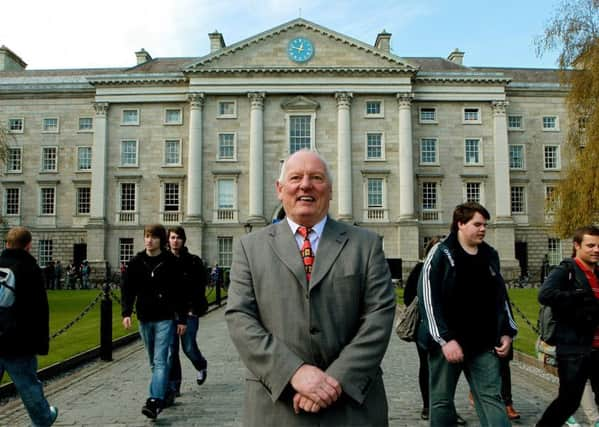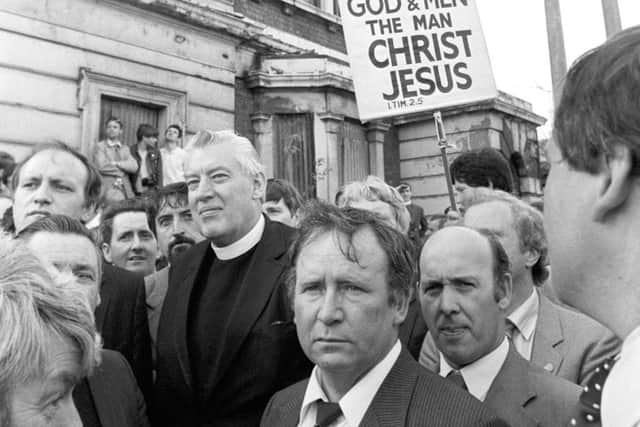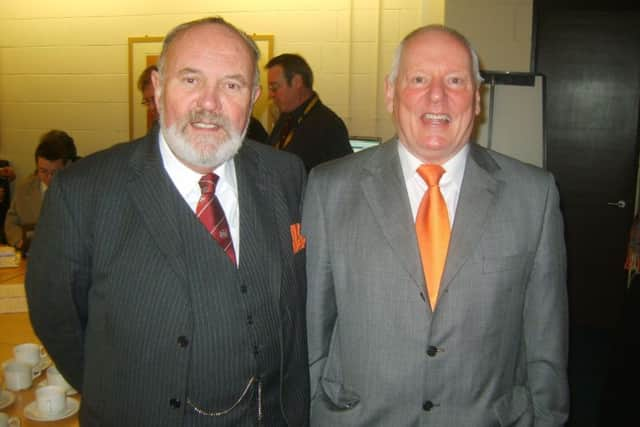Jeff Dudgeon: I have long battled with the DUP over gay rights, but I do not find them hostile now


My disputation and difficulties with the DUP go back over 40 years yet I have won every battle where gay rights are concerned.
The list is long and includes reducing the age of consent in 1994 (enabled by a Kate Hoey amendment) and in 2000, equality under the criminal law in 2003, and civil partnership in 2004.
Advertisement
Hide AdAdvertisement
Hide AdIndeed I was instrumental this year in getting the gay pardon and disregards legislation extended to Northern Ireland with the assent of the Assembly.


That was a first for the DUP, in that the party enabled a gay reform, albeit indirectly, by tabling a Legislative Consent Motion in the Assembly so Westminster could include Northern Ireland in the Policing and Crime Bill’s gay pardon aspects.
The circumstances are interesting and tell of the change in the DUP under Arlene Foster, a former Ulster Unionist.
The minister of justice Claire Sugden first told me that on the advice of officials it was impossible to get Northern Ireland included in the Bill then going through the House of Lords.
Advertisement
Hide AdAdvertisement
Hide AdI said it could be done, and had been several times in the past, but urgent action was needed. This she then organised, getting Arlene Foster and the late Martin McGuiness to agree to it over a weekend. Unprecedented speed for Stormont.


The DUP would have had to vote for the motion had not the sole opponent, Jim Allister of the TUV, failing to force a division when he could not get a second teller.
The DUP MLAs may have looked uncomfortable but it reflected their acceptance of the modernisation required to govern a very mixed province.
Until this election result, I had hoped and expected that a longer period of direct rule, or stealth rule as it is now called, would have enabled the marriage reform to be legislated by Order in Council at Westminster.
Advertisement
Hide AdAdvertisement
Hide AdGay marriage legislation however can proceed at Stormont given a majority of MLAs, since the March election, favour the reform. The DUP no longer has sufficient votes to veto change through the ‘Petition of Concern’ procedure. But that first requires the Assembly back up and running.


In effect, Sinn Fein is now delaying equal marriage by holding back Stormont’s return.
I can only take the long view. For young people, events before say 2010 are history, for me I lived through them. I observe the developments and can trace the progress. Changes come better incrementally even if you don’t believe in that when campaigning.
However I have first to say, that when it mattered, not a single political party in Northern Ireland, not even the virtue-signalling Sinn Fein and Alliance parties, gave any assistance in the long and bitter campaign to decriminalise homosexuality.
Advertisement
Hide AdAdvertisement
Hide AdThis was the case even when all 25 Northern Ireland gay campaigners were arrested in 1976 on suspicion of conspiracy. Gay people here did it on their own, with the assistance of the Strasbourg court, some lawyers and journalists and the poet John Hewitt but no politicians helped.


Indeed in 1977, when Jim Callaghan’s Labour government was in difficulty and needed parliamentary support, part of its deal with the Unionists was to dump the proposed gay law reform. (The deal also gave 50% more representation to the province as it went from 12 to 18 MPs.)
So Ian Paisley’s ‘Save Ulster from Sodomy’ campaign of that year looked like it had won.
This betrayal obliged us to press our ECHR case at Strasbourg to the end. It lasted seven years and was judged in my favour in 1981. The Tory government, unusually rapidly, in 1982, implemented the necessary Order in Council. No unionist or SDLP MP voted in favour, not even the three unionist MPs now known to be gay or who had a gay sensibility!
Advertisement
Hide AdAdvertisement
Hide AdIt is interesting to note that the most prominent campaigner for implementation of the Wolfenden Report on homosexual law reform in England was the MP for North Belfast, Montgomery Hyde, who was deselected in 1959 in a campaign where Rev Ian Paisley cut his political teeth. And Hyde wasn’t gay, marrying three times.
Now 45 or 7% of the MPs at Westminster are gay or lesbian or bisexual, a high representation for a community of about 2%, according to ONS survey figures. (They take no account of a greater fluidity in sexual orientation so noticeable today).
The world has turned upside down, although none of these MPs come from Northern Ireland. However 5% of Belfast City Council is now LGBT, including this author.


I have to say, working alongside the dozen DUP councillors in City Hall that I hear and experience no anti-gay sentiment. They do draw the line by opposing equal marriage, as do all the churches here, Unitarians excluded, yet I have listened to young DUP members who cannot comprehend how anyone would be opposed to gays marrying.
Advertisement
Hide AdAdvertisement
Hide AdThe DUP is no longer dominated by Free Presbyterians although they are disproportionately represented at its core. That church’s membership of 20,000 is small but like the IRA Army Council to Sinn Fein, the key body when it comes to major decisions on change. It is not so powerful since Ian Paisley went into coalition with Sinn Fein and lost his position in the church he founded.
Arlene Foster is a Fermanagh Anglican while in Belfast the DUP is increasingly reflective of the population that votes for it, which includes thousands of non-church going Protestants.
Gay marriage was voted through in a 2016 referendum in the Republic of Ireland by 60%, despite homosexual acts only being decriminalised there in 1993 after David Norris’s Strasbourg case.
Interestingly, heading into the border counties that referendum majority began to ebb away. However the marriage issue was much more than about homosexual couples, it was a youth issue, and throughout the island is now a test of modernity.
Advertisement
Hide AdAdvertisement
Hide AdThe question has put some older gay campaigners, me included, in a quandary. I successfully led the campaign to get Northern Ireland included in the 2004 civil partnership law which the Labour government eventually conceded. But their position was that civil partnership would stand in for marriage and nobody then, bar Peter Tatchell, argued that gay marriage was needed.
Hardly a decade later, MPs led by David Cameron legislated for such marriage in England and Wales.
The abortion issue is the other big moral dispute in Northern Ireland and the law is devolved, unlike in Scotland. Until only a couple of years ago no party supported any reform, and certainly not the extension of the 1967 Act to Ulster.
Now the SDLP which represents Catholic Catholics has split on the issue and even the DUP is no longer holding the line on aspects of ‘reproductive health’. Some minor change could be introduced, not least getting the NHS in Belfast to agree to pay for abortions carried out in Britain.
Advertisement
Hide AdAdvertisement
Hide AdWith the advent of the medical abortion, the debate will have to change although it is currently in the blind alley of abortion on rape or fatal foetal abnormality grounds. In the meantime, attempts to convict women for using imported pills seem to be on hold.
Distress in Britain amongst liberals and socialists at the imminent supply and confidence arrangement between Theresa May and the DUP is understandable, if exaggerated. Northern Ireland is in the UK so why shouldn’t our MPs be involved in government? Indeed the notion that London is a neutral broker on Northern Ireland - where Dublin never was or is - played an important role in extending the IRA war by giving them a psychological sense of imminent success.
London (and Dublin) oblige the DUP to sit in a mandatory coalition with Sinn Fein in Belfast which is vastly more difficult to thole than the DUP extracting occasional financial concessions at Westminster.
Hopefully some other reforms will also be involved in the deal like compensation for all Libyan Semtex victims and a fair and balanced legacy arrangement that includes or subsumes inquests into the notioned historical investigation unit.
Advertisement
Hide AdAdvertisement
Hide AdRuth Davidson can rest assured things won’t be going backwards on LGBT rights in Northern Ireland.
In fact devolution, although it never brought about a return to saving Ulster from sodomy, made progress more difficult, until perhaps this year. But it has and will continue to happen, deal or no deal with Theresa May.
• This article was written for the leading London think-tank, Policy Exchange. Jeffrey Dudgeon is a Belfast City Councillor for the Ulster Unionist Party, the successful plaintiff in 1981 at the European Court of Human Rights on the criminalisation of gay men in Northern Ireland, and author of ‘Roger Casement - The Black Diaries’